I Just Went Snowshoeing. I Have Notes
I got a pair of snowshoes for the holidays and finally decided to strap them on and go for a walk. There's certainly enough snow and the field outside is flat. What could go wrong?At Out Traveler we encourage people to travel and adventure with the right gear. On my jaunt I realized I didn't have the right gear for snowshoeing. Who knew there was right gear for snowshoeing? Before you go snowshoeing here are a couple of things you might want to know.Snowshoes Can SinkI imagined that my snowshoes keeping me magically hovering above the snow. That's not what happened. Instead I sank into the snow. The snowshoes kept my feet from sinking as deep into the snow as they would if I didn't have the equipment on. But that's it.It seems that how deep one sinks is different on different kinds of snow, and can vary just inches apart. Sometimes one foot sank in 2 inches while the other side sank 2 feet. Don't Cross Barbed WireYou come to a barbed wire fence that looks like you can just step over it. What could go wrong? Well you could get one foot over and then sink two feet and suddenly find your crotch impaled on the barbs. Best case you only leave behind fabric from your pants. If it embeds deeper you may need a tetanus shot.Stick to TrailsThe capricious nature of snow (and the dangers of barbed wire) suggests that beginners may want to stick to groomed trails. Bundle UpEspecially on cold days and when the windchill is below zero, you need to wear a lot of layers and cover your face. Frostbite can hit quickly, and especially on exposed noses, ears, and fingers. Bundle up. Also, you will want snow pants on off trail because the snow can kick up and soak your jeans from waist down. Snowshoeing Is a WorkoutSnowshoeing isn't a walk on the beach (at least in deep snow). It's a slog. It uses different muscles than simply walking, and burns more calories than a simple walk. What does this mean? You may sweat. You will need to hydrate and replenish your energy. Take water and protein snacks. Bring a PackIts 10 degrees outside but once you get moving and the sun comes out you can start to overheat quickly. In cold weather sweat is your enemy because it can freeze and make you more susceptible to hyperthermia. So bring a pack, so you can strip off some of your layers. You don't want to just tie your coat around your waist: I got home with a hood full of snow. You May FallYou can trip over your bigger feet, or the different kinds of snow can destabilize you and you can end up in a snowbank. Fortunately it's often a soft landing. More reason to wear snow pants. Use PolesI hadn't heard about using poles while snowshoeing, but after going without I can definitely say I recommend them. Especially off trail. They can help you maintain balance and may assist when you are trying to pry yourself off of barbed wire. Buy GaitersGaiters are thin water resistant sleeves that go over the bottom of your pants and the top of your boots. You'll want them. They keep the snow out of your boots..Wear BootsOkay, I swear this isn't something I learned from my experience. But I recently saw someone show up wearing regular running shoes and expecting to strap snowshoes on them. I felt so bad for them that I lent them the snow boots I keep in my trunk. Joke was on them though — apparently a mouse had made a nest in them. That's how rarely I do winter sports. So to sum up, if you haven't gone snowshoeing before maybe go with a friend, or do some research and come prepared with the right gear, or stick to groomed trails at outdoor recreation areas. And avoid barbed wire fencing.
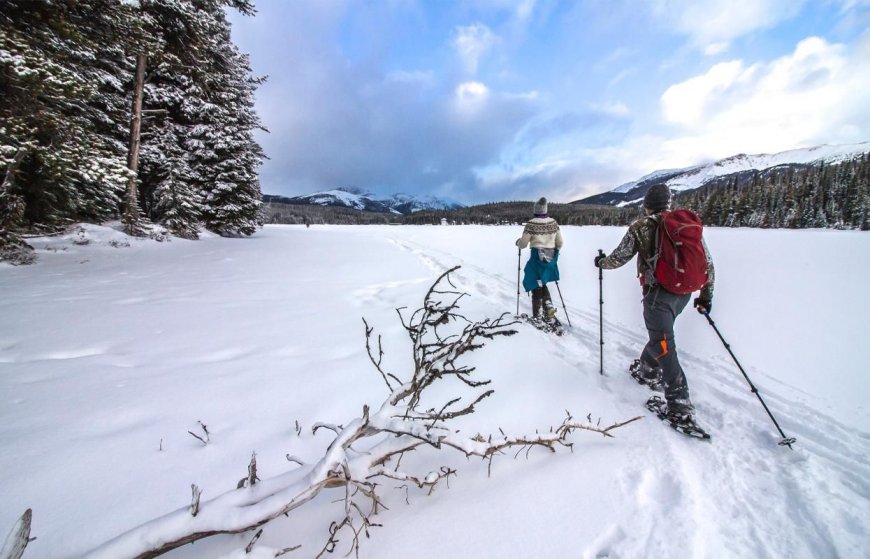

I got a pair of snowshoes for the holidays and finally decided to strap them on and go for a walk. There's certainly enough snow and the field outside is flat. What could go wrong?
At Out Traveler we encourage people to travel and adventure with the right gear. On my jaunt I realized I didn't have the right gear for snowshoeing. Who knew there was right gear for snowshoeing?
Before you go snowshoeing here are a couple of things you might want to know.
Snowshoes Can Sink
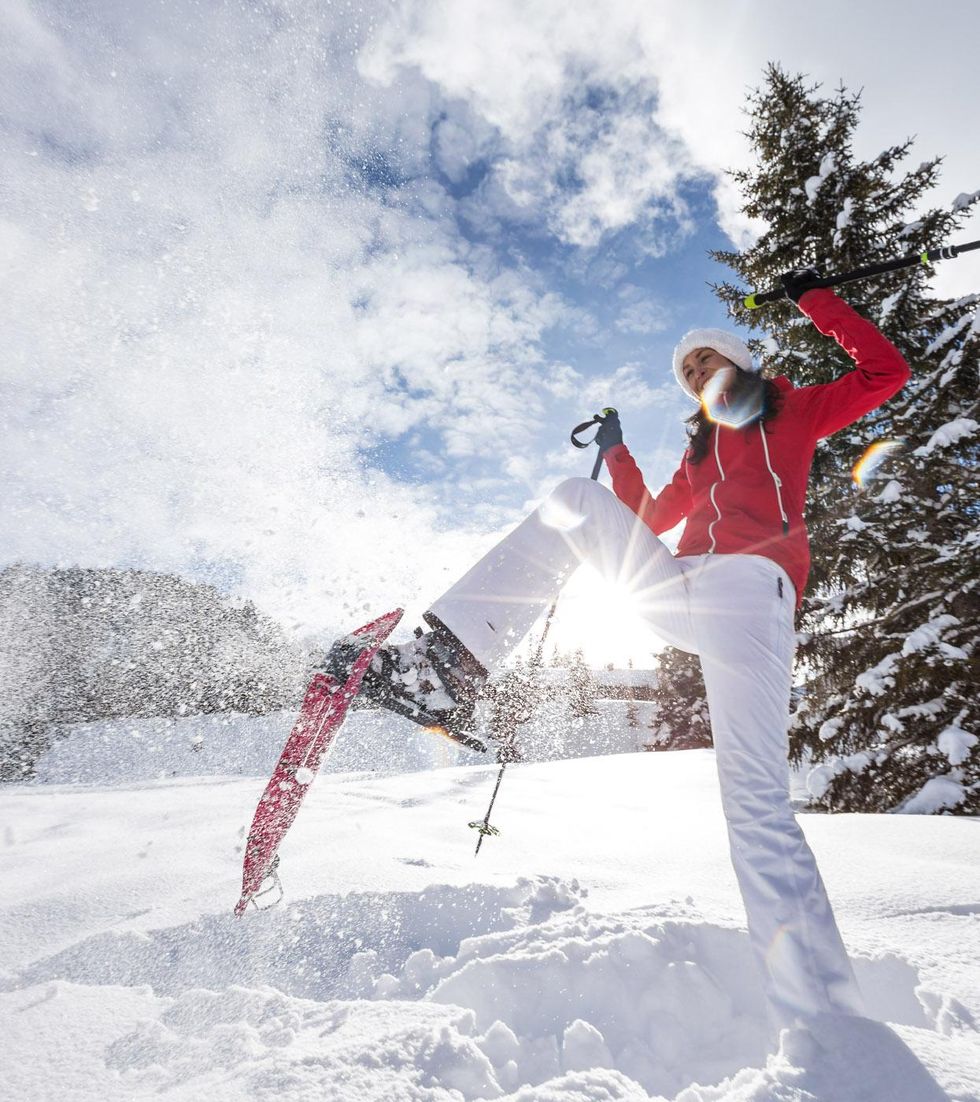
I imagined that my snowshoes keeping me magically hovering above the snow. That's not what happened. Instead I sank into the snow. The snowshoes kept my feet from sinking as deep into the snow as they would if I didn't have the equipment on. But that's it.It seems that how deep one sinks is different on different kinds of snow, and can vary just inches apart. Sometimes one foot sank in 2 inches while the other side sank 2 feet.
Don't Cross Barbed Wire
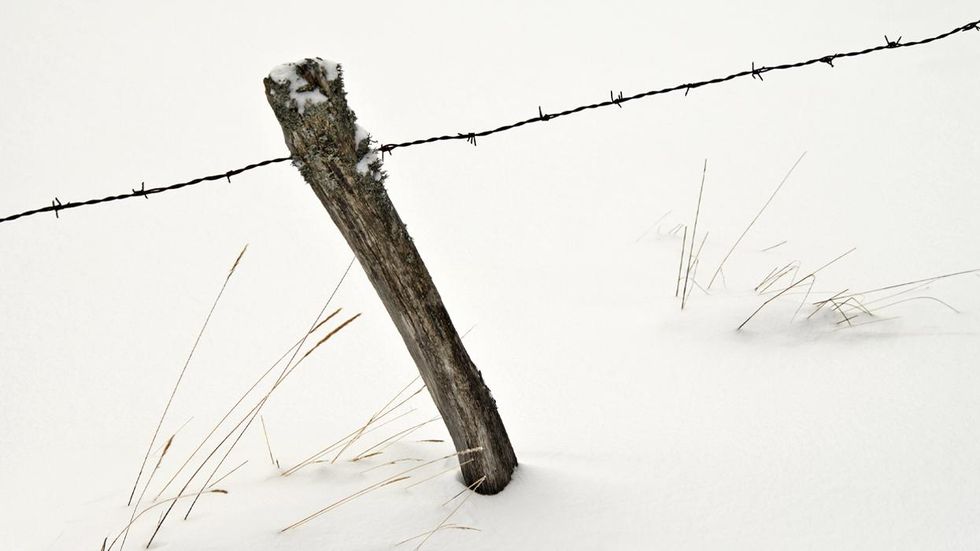
You come to a barbed wire fence that looks like you can just step over it. What could go wrong? Well you could get one foot over and then sink two feet and suddenly find your crotch impaled on the barbs. Best case you only leave behind fabric from your pants. If it embeds deeper you may need a tetanus shot.
Stick to Trails
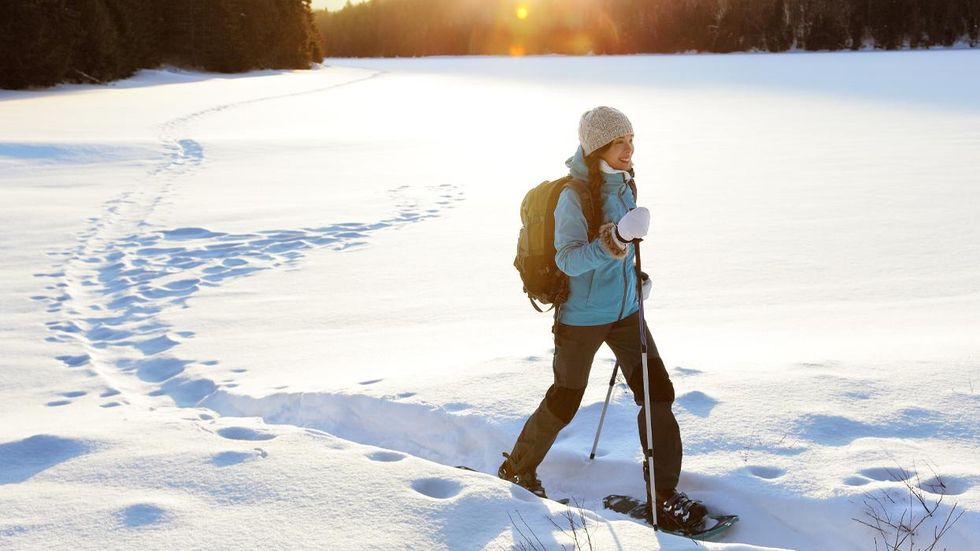
The capricious nature of snow (and the dangers of barbed wire) suggests that beginners may want to stick to groomed trails.
Bundle Up

Especially on cold days and when the windchill is below zero, you need to wear a lot of layers and cover your face. Frostbite can hit quickly, and especially on exposed noses, ears, and fingers. Bundle up. Also, you will want snow pants on off trail because the snow can kick up and soak your jeans from waist down.
Snowshoeing Is a Workout
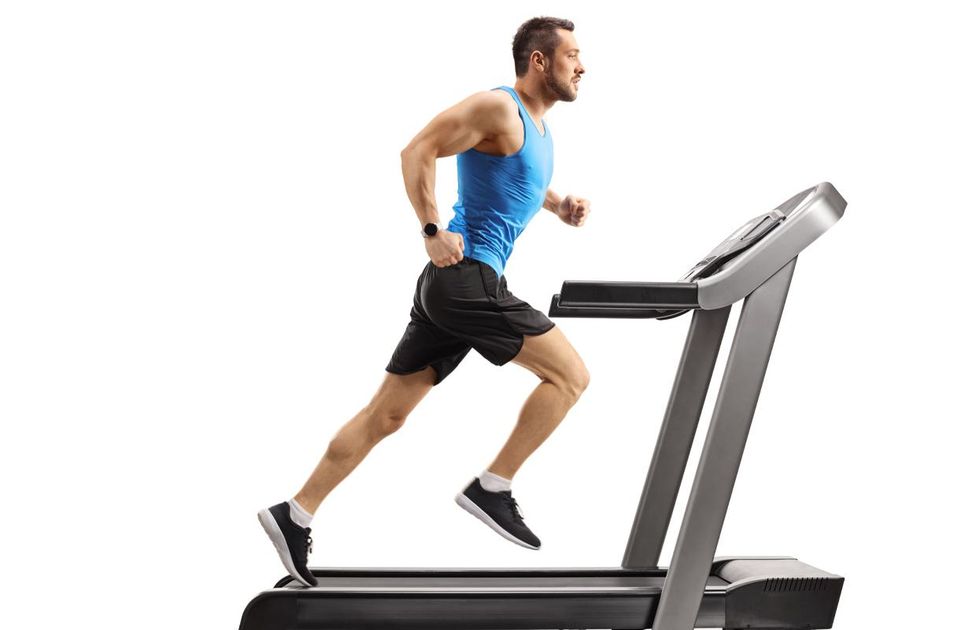
Snowshoeing isn't a walk on the beach (at least in deep snow). It's a slog. It uses different muscles than simply walking, and burns more calories than a simple walk. What does this mean? You may sweat. You will need to hydrate and replenish your energy. Take water and protein snacks.
Bring a Pack
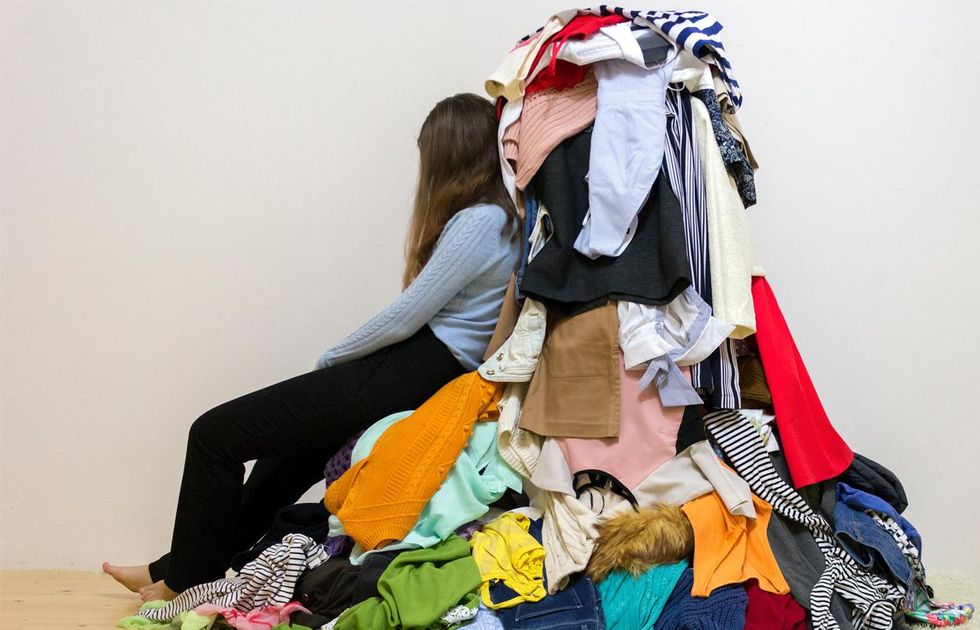
Its 10 degrees outside but once you get moving and the sun comes out you can start to overheat quickly. In cold weather sweat is your enemy because it can freeze and make you more susceptible to hyperthermia. So bring a pack, so you can strip off some of your layers. You don't want to just tie your coat around your waist: I got home with a hood full of snow.
You May Fall
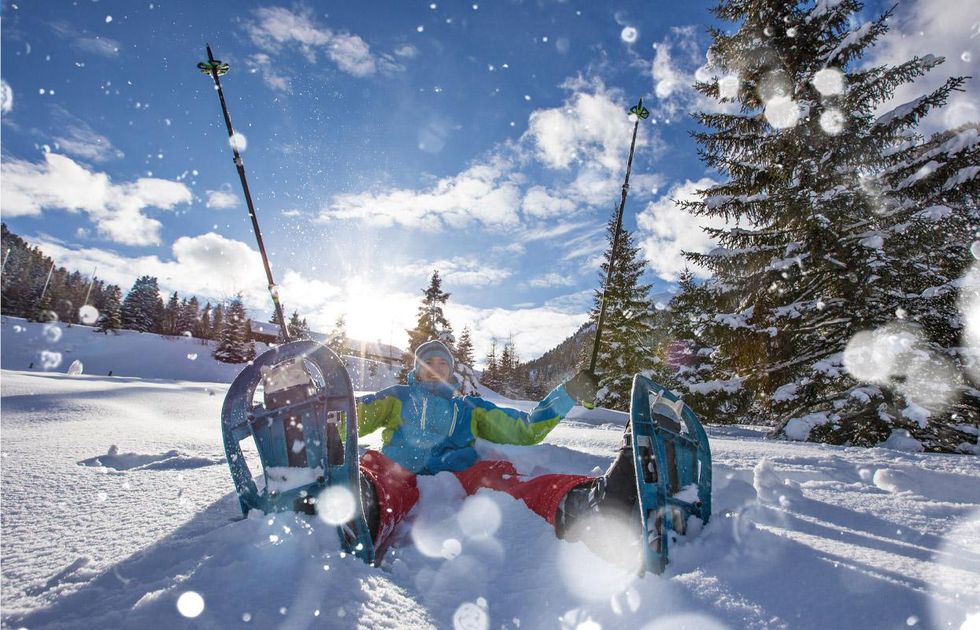
You can trip over your bigger feet, or the different kinds of snow can destabilize you and you can end up in a snowbank. Fortunately it's often a soft landing. More reason to wear snow pants.
Use Poles

I hadn't heard about using poles while snowshoeing, but after going without I can definitely say I recommend them. Especially off trail. They can help you maintain balance and may assist when you are trying to pry yourself off of barbed wire.
Buy Gaiters

Gaiters are thin water resistant sleeves that go over the bottom of your pants and the top of your boots. You'll want them. They keep the snow out of your boots..
Wear Boots
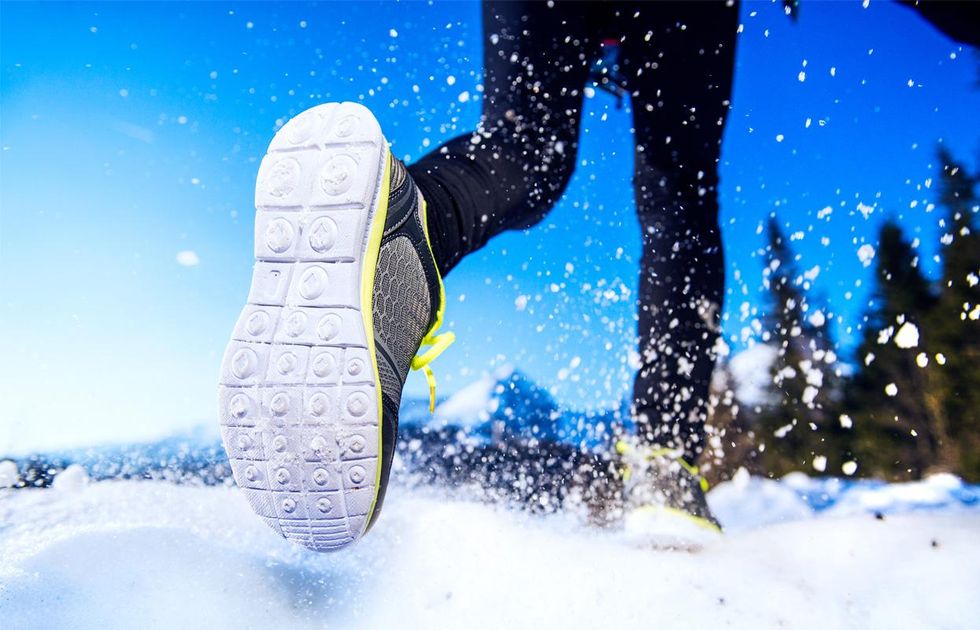
Okay, I swear this isn't something I learned from my experience. But I recently saw someone show up wearing regular running shoes and expecting to strap snowshoes on them. I felt so bad for them that I lent them the snow boots I keep in my trunk. Joke was on them though — apparently a mouse had made a nest in them. That's how rarely I do winter sports.
So to sum up, if you haven't gone snowshoeing before maybe go with a friend, or do some research and come prepared with the right gear, or stick to groomed trails at outdoor recreation areas. And avoid barbed wire fencing.

 Mark
Mark 





